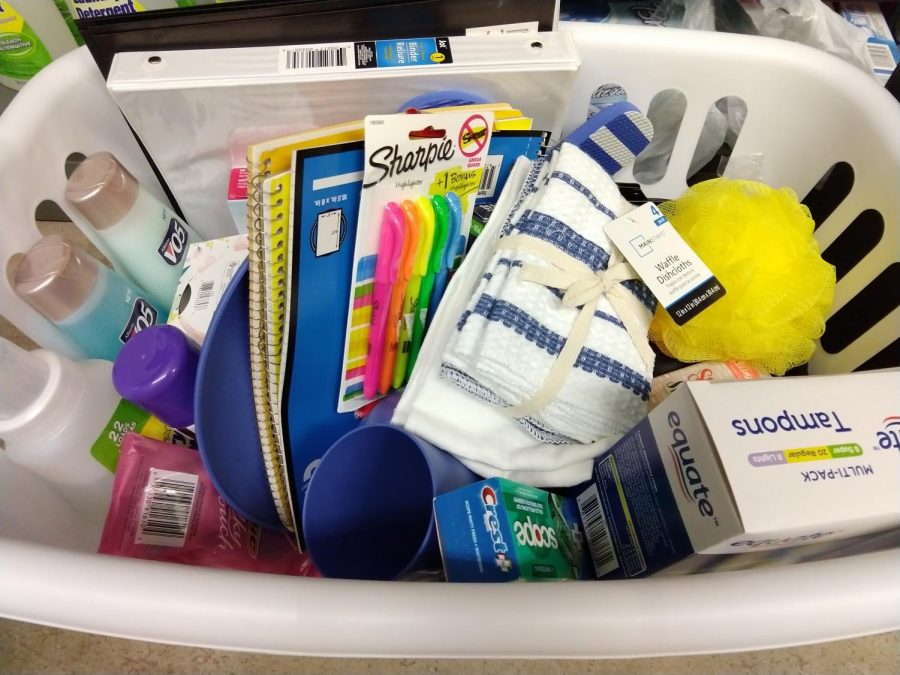Fostering success for students formerly in the foster care system, homeless
Taz Smith started a new program, called Fostering Success, that created welcome baskets for fifty incoming students over the summer
More stories from Rebecca Mennecke
Photo by Submitted Photo
Taz Smith, a second-year criminal justice student, started a program dedicated to those with experience in the foster care system or who have experienced homelessness, transition from high school to college.
Taz Smith is a busy bee.
Now a second-year criminal justice student, Smith’s first semester at UW-Eau Claire last year comprised 18 credits of classes, work at the front desk at Oak Ridge Hall and practice and performances for the Blugold Marching Band. During her second semester, she picked up a second job at LTS training, and, over the summer, she picked up a third job at the Think Tank.
Like a bee, Smith has also moved around the Midwest, having had grown up with a mother who had alcoholism and an absent father with drug addiction.
“Growing up, stability wasn’t something that we had,” she said.
Over the summer, Smith applied her background in the foster care system and her affinity for staying busy to a new program at UW-Eau Claire — Fostering Success.
This program provided welcome baskets for incoming students who come from backgrounds in the foster care system and/or experience homelessness, Smith said. Items in these baskets included toiletries, towels, laundry detergent, school supplies and other items that would help students change over from high school to college, according to the UW-Eau Claire website.
“After going through the foster care program, I knew that it was broken,” Smith said. “I knew that a lot of kids were getting lost in transition from high school to college, and I knew that wasn’t okay.”
Smith began the Fostering Success program as a service learning project, Smith said. She had a difficult time getting into UW-Eau Claire, since she was recognized as a ward of the state, or someone in foster care, and wasn’t recognized as a Wisconsin resident. Therefore, she had to pay out-of-state tuition, she said.
“That was a big hurdle for me to jump over,” she said.
She eventually found a solution to allow her to pay in-state tuition, but it made her consider why other people in the foster care system don’t go to college, she said.
At the same time Smith pursued her plans to help with the transition from high school to college, Angie Swenson-Holzinger, the associate director of the Advising, Retention and Career Center, recognized a need for a program like Fostering Success, which started at UW-Stout. Swenson-Holzinger has been at UW-Eau Claire for two years, but she formerly worked at UW-Stout. She heard about the Fostering Success program and recognized the impact it had there, she said.
Swenson-Holzinger is a part of Leadership Fellows — a faculty and staff professional development opportunity — which chooses projects every year to positively impact UW-Eau Claire, she said. They created an advisory board comprising professionals on campus and from the community. Swenson-Holzinger pitched the idea of Fostering Success. The first step was proving UW-Eau Claire had a need for a program like that.
Financial Aid queried FAFSA, which has five questions that could indicate former foster care experience or homelessness. Last year, 50 students answered “yes.”
According to FAFSA data, this number has been rising.
In the 2017-18 school year, 48 students answered “yes.”
In the 2016-17 school year, 40 students answered “yes.”
In the 2015-16 school year, 39 students answered “yes.”
In the 2014-15 school year, 32 students answered “yes.”
In the 2013-14 school year, 32 students answered “yes.”
In the 2012-13 school year, 28 students answered “yes.”
When new students come to the university, they are asked to fill out an academic planning questionnaire. They modeled a question regarding experience with the foster care system and homelessness, where another fifty students, all incoming students, responded “yes.”
So, there definitely was a need, Swenson-Holzinger said. After connecting with Taz Smith, they knew they had everything they needed to make the program a go.
Now, the current challenge of the program is finding it an institutional home so it can continue in the future, Swenson-Holzinger said.
“It’s kind of, ironically, homeless,” she said.
The program has five subcommittees: Welcome/Finals Baskets & Fundraising; Financial Aid, Literacy and Scholarships; Housing; Student Involvement & Mentorship; and Community Involvement.
“In my mind, it’s just a matter of time for it to find its home,” Swenson-Holzinger said.
Students interested in getting involved with the Fostering Success program should email Swenson-Holzinger at [email protected].
As someone who sees the glass as half-full, Smith said she’s glad to be making an impact.
“Seeing other people happy and helping other people makes me happy,” Smith said.
Regardless of whether students reach out to help with Fostering Success or, like Smith, want to start a program of their own, Swenson-Holzinger recommends just taking that chance to reach out.
“You never know how it might open doors that you never even knew were there,” she said.
Mennecke can be reached at [email protected].











